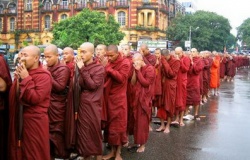HH Dalai Lama in Ethics for the New Millenium explains the Tibetan word for compassion
"As such, our innate capacity for empathy is the source of that most precious of all human qualities, which in Tibetan we call nying je.
Now while generally translated simply as "compassion," the term nying je has a wealth of meaning that is difficult to convey succinctly, though the ideas it contains are universally understood. It connotes love, affection, kindness, gentleness, generosity of spirit, and warm-heartedness.
It is also used as term of both sympathy and of endearment. On the other hand, it does not imply "pity" as the word compassion may. There is no sense of condescension. On the contrary, nying je denotes a feeling of connection with others, reflecting its origins in empathy."
Living in Compassion (Rinchen, Inc., May 2001) by Ven. Bardor Tulku-Rinpoche of Karma Triyana Dharmachakra, His Holiness Karmapa's seat in North America, includes a discussion of marriage and relationships; a commentary on The 37 Practices of a Bodhisattva; the Six Perfections, and more. The book is US$16.95 and is available from Namse Bangdzo.
Rinpoche, who is married and has three daughters, is well qualified to write about such things:
Question: One important quality you have talked about is limitless compassion. Sometimes there are situations, however, where that particular attitude might not be understood. Perhaps someone like a drug addict or an alcoholic may see your compassion and decide to take advantage of you. Do you have any suggestions on how to practice compassion in that situation?
Rinpoche: In walking the bodhisattva path, we need to avoid what has been called "idiot compassion." That refers to compassion that tries to be "nice" and make people happy. It involves doing what they want rather than what is needed. It is really about making ourselves feel good, rather than actually practicing compassion. What is missing in this is wisdom. Bodhisattvas cultivate and practice limitless compassion which is endowed with the quality of wisdom. When you have that, no one can take advantage of you because of the sharpness and clarity of that wisdom. It cuts through any faults or mistakes that might come about, including being taken advantage of. In a situation where someone is trying to take advantage of you, you will actually know what will benefit them and what will not. With that awareness, you can apply your compassion and do your best for that person, even if it means not doing what they want. When the compassion is joined with authentic wisdom in this way, the outcome will always be beneficial.
~ Venerable Bardor Tulku-Rinpoche, 45-46.
AND
. . . one of the negative actions connected with speech is known as "hurtful speech." This could mean any kind of aggressive verbal abuse, and it could mean creating disharmony between friends, relatives, husbands and wives, or in a community, all by engaging in negative talk. The opposite, positive action would be to engage in
gentle, conciliatory, and helpful speech. ( 29)
. . . .
As we close this section, there are a few things I would like you to
remember. First, there are a few more thoughts from Padampa Sangye, who was one of the great teachers of Buddhism in Tibet.
He said that much of the time our communications with each other are like the way people talk in a crowded marketplace. People are chattering at the same time but not listening to each other. He was saying that we need to learn to listen to each other, appreciate our relationships, and learn to work with difficulties of the situation rather than alienating ourselves from each other. He also said that it is the responsibility of men and women to love each other and work out their relationships." (41)
. . . .
The second of the four things taught in the sutras is abandoning criticism of other bodhisattvas, which means other mahayana practitioners in general, and especially realized bodhisattvas. It says, in stanza thirty-two, "If, under the power of mental afflictions, a mahayana practitioner proclaims the defects of another bodhisattva or mahayana practitioner, the the proclaimer becomes impaired (the proclaimer's virtue degenerates). It is therefore the practice of bodhisattvas not to proclaim the defects of those who have entered the mahayana."
This refers to situations where through the power of mental afflictions, especially jealousy, a mahayana practitioner bad-mouths another mahayana practitioner -- proclaims their downfalls, the defects in their conduct, their general failings, and so on. And this only hurts the one who is broadcasting the faults, because they are acting out jealousy. It is therefore the practice of bodhisattvas not to criticize other beings in general, and especially those who have entered any vehicle of Dharma, and most particularly the mahayana. In short it means to be careful with your speech -- to control your speech. Essentially the point of this, which goes along with the previous stanza, is to be more concerned with your own defects than the defects of others (94-95.)
. . . .
Finally, the fourth thing taught in the sutras is to abandon harsh speech. In stanza thirty-four it says, "Since harsh words agitate the minds of others, and therefore cause one's bodhisattva conduct to degenerate, it is the practice of bodhisattvas to abandon harsh words that are unpleasant for others."
When we do not pay attention to our own defects through carelessness, for example, we may become angry and carelessly speak harshly to others and agitate them. This can hurt their feelings and make them angry.
Therefore bodhisattvas and those practicing the mahayana should speak gently when they speak. They should speak appropriately, and in a manner that is easy on the ears and that sounds right to those who are hearing it. When you speak carelessly and hurt someone's feelings, this is obviously going directly against the whole purpose of the bodhisattva path -- which is not to cause suffering, but to bring beings happiness. It is therefore a great downfall for a bodhisattva to do so.
Therefore bodhisattvas abandon harsh words, which means that they think carefully about what sort of language and what sort of things to say that will actually be pleasant and appropriate for that person. Watching one's speech is very important. In general it is said, "When alone, look at
your mind; when in company, look at what you are saying." (95-96.)
. . . .
Question: I wanted to ask about verse thirty-two, which is connected
with abandoning criticism of other bodhisattvas. Is it ever appropriate, under special circumstances, if you feel that there are individuals who could be harming others, and you feel that to benefit someone else, you should let them know about this person's activity?
Rinpoche: The text is not saying that you should never criticize other
practitioners. If appropriate, you can and should do so when it is necessary in order to prevent a situation of harm or abuse, as you said. However, you should not do so out of dislike or jealousy. ~ (Bardor Tulku-Rinpoche 103) Namo Guruye



